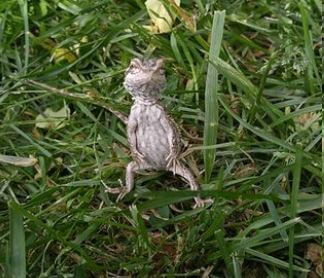Do bearded dragons sleep standing up?
A few weeks ago, while I intended to change the food bowl of my bearded dragon late at night, I was amused by my pet’s sleeping position.
He was standing up against the wall.
First, I thought he could not sleep. So he just stood there and looked outside of the cage.
However, after having a closer look, I concluded that he had fallen asleep.
To find out if that is not a case to be concerned, I have gone through many research and shreds of evidence.
Finally, I have the answer for myself. In actuality, bearded dragons sleep standing up from time to time.
If you are wondering whether to worry about it or not, scroll down for the full detail!
Related Posts:
- Bearded Dragon Sleeping in Water Dish: What You Should Know
- Can I Put My Bearded Dragon in a Hamster Ball?
- Do Bearded Dragons Fight to Death? What You Need to Know
- What Happens If a Bearded Dragon Gets Too Cold?
Do Bearded Dragons Sleep Standing Up?
Do bearded dragons sleep standing up?
Yes, they do. While beardies often sleep on their stomachs, there are some cases you see them do that in the upright position.
The most common reason is that they like the odd posture. Besides, they might feel stressed, so they want to change to a more comfortable (or abnormal) sleeping position.
Thirdly, when they put their bellies lying against the cage’s wall to doze, the temperature may be unusual.
Although the second last reasons are relatively worrisome, the sleeping posture is not worth worrying about.
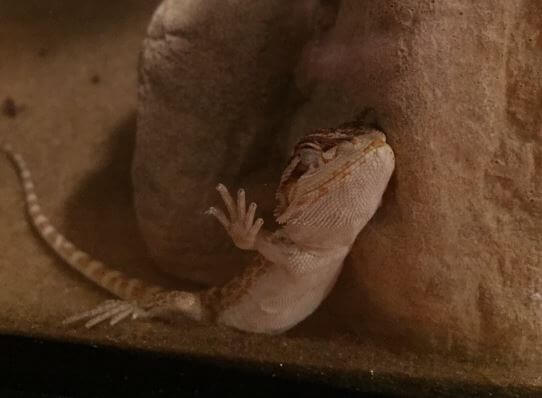
Where Does a Bearded Dragon Sleep?
The place a bearded dragon sleep has a crucial impact on their sleeping behaviors and positions. As a result, you might want to know the ideal bed with your pet.
In the wild, that kind of bearded dragon always finds a sheltered spot to lie down. Not only does the place have to be warm enough at night, but it also must be discreet to protect them from predators.
Some highlight examples are dens, rock hollows, fallen logs, burdens, tree hollows or holes, etc.
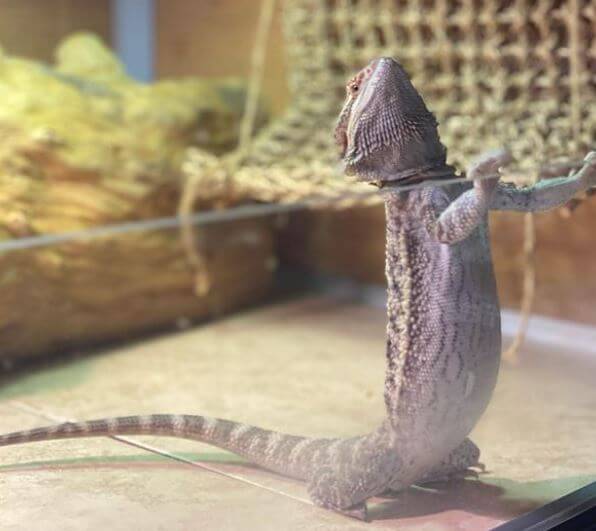
Instead of finding the most suitable place for them in captivity, beardies are put into a specific cage made by humans. Consequently, it is possible that the enclosure does not comfort them.
So, bear in mind to choose and install your pet’s shelter carefully. Keep the enclosure away from distractions and being warm alike. Plus, some hideouts and hiding places are necessary.
Why Is My Bearded Dragon Sleeping Standing Up?
1. They Prefer the Position
The first reason I found most bearded dragons resting in the vertical position is because of their preference.
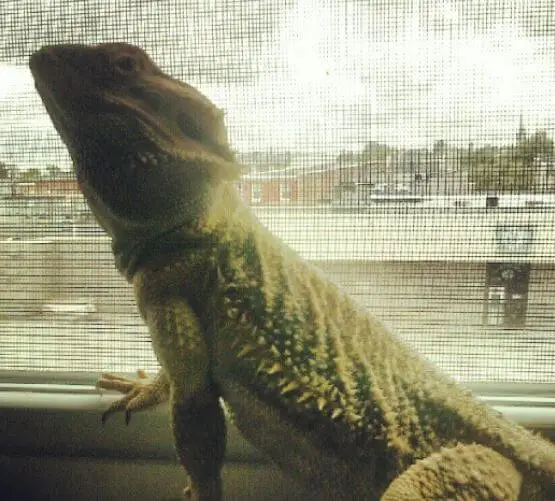
While it sounds strange at first, both wild and domesticated beardies are well-known for sleeping in unnatural postures. Significantly, the wild ones love the high beds, such as home walls, fence posts, or sides of trees.
With your beloved pets, they do not have trees or branches to climb on and sleep on, so they might find that the walls of the cage are comfortable to take a nap.
2. They Are Stressed
Have you ever heard about glass surfing? That might be another culprit making bearded dragons sleep standing up.
By definition, glass surfing is the behavior of some beardies who want to climb on the glass wall of the cage. For some reason, they are stressed due to the current environment. Consequently, they want to escape.
As I have just mentioned, bearded dragons can sleep in any position and anywhere as long as they find it comfortable. So, if they have tried all day to run out of the cage by glass surfing, there is a high possibility that they want to sleep right in the posture.
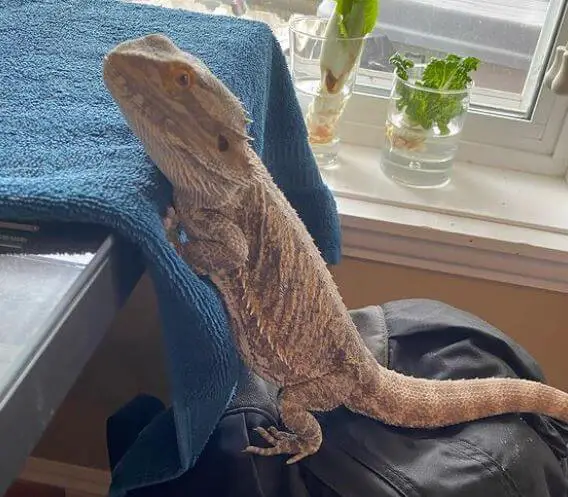
To solve the issue, you should think about the shelter’s condition. Is the cage too small or dirty for an adult beardie? Or is the lighting or temperature higher or lower than usual?
Ironically, some bearded dragons even stick to the glass wall because they see their reflection. Such curious animals can not miss any strange thing in their surrounding. Notably, the thought about another counterpart always makes them stressed.
3. There Is Abnormal Heat
If you are a bearded dragon lover, you might not suspect the importance of heat with your body. Therefore, only a tiny change in the temperature can considerably affect the bearded dragon sleeping standing up.
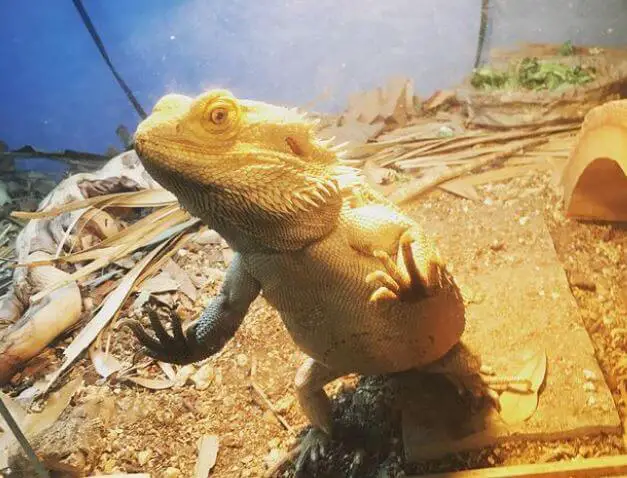
When the gradient temperature is higher or lower than the standard degree, the animal might want to press up their body against the cool glass wall of the tank. Plus, while sleeping, his hind legs would stay upright to keep balance.
Imagine when you have to sleep in such a hot room without a conditioner. You might want to find the most remarkable area in the suffocating space. And you might never try to think if your sleeping posture is gentle or not.
How to Fix Bearded Dragons Sleep Standing Up?
Once the strange sleeping position of your pet is trouble, I recommend some methods to ease your anxiety.
1. If It Is Their Preference
There is no need to worry in this case. All you need to do is wait for a few days, and they will come back to the normal position. Like kids or even some adults, it is not easy to keep the same place sleeping.
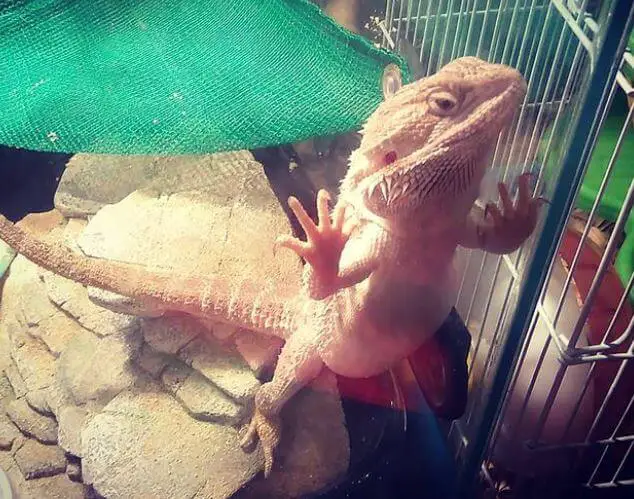
By contrast, once you notice your pet remains standing up while sleeping for more than a few nights, you should do some additional tests. That might not be their favorite posture but a behavior reflecting health problems.
2. If It Is Because of Stress
Regarding the stress reason, pay close attention to your pet’s behavior first. Once they attach to the glass and try to climb out of the cage all day and night, you can use some solutions below.
Suppose the cage is too small, you should find a bigger and better one. Some stunning enclosures are fitting all kinds of beardies, such as:
- REPTI ZOO 67-gallon Upgrade Glass Reptile Large Terrarium
- Oiibo 67-gallon Reptiles Premium White Knock Down Glass Terrarium
Moreover, you should check the temperature as well. Ideally, the heat can vary from 23°C to 29°C on excellent sides. Higher is the heat in basking spots, from around 35°C to 41°C.
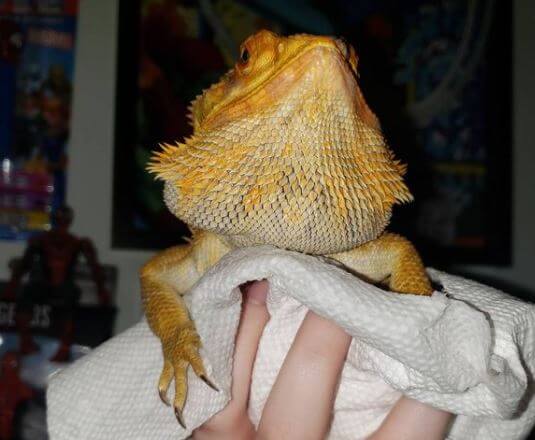
Once the standard temperature sharply goes up or down, your cold-blooded reptile would be seriously affected. Primarily, they might gradually lose the ability to absorb calcium or digest food.
Additionally, the reflection can be the cause of the stress. Then, consider wrapping the tank’s wall. The method can block your pet’s view of his image.
3. If It Is Caused by Wrong Temperature
To tackle the inaccurate temperature, you have to make sure the enclosure is large enough to have a cooler side. In my opinion, it also can not lack a specific lamp to lit the entire place as well as a basking spot.
Besides, it would help if you check the basking bulb and the temperature regularly. Although the bearded dragon is a reptile living in hot areas, too high heat might kill them.
I recommend some of the best basking bulbs to give your pet a better living environment:
- 2 Pack 75W Reptile UVA Infrared Heat Lamp
- BOEESPAT 75W UVA + UVB 3.0 Full-spectrum Sun Lamp Sunbathe Heat Light
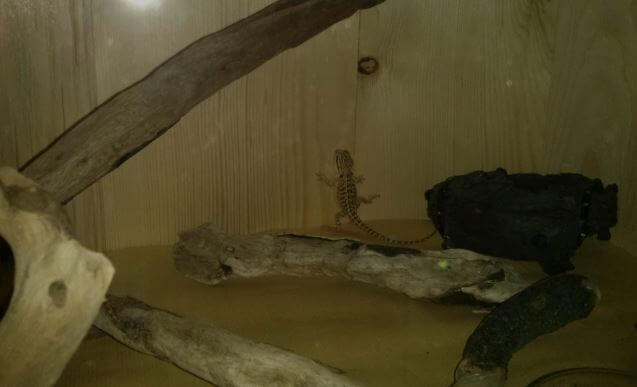
What Are Other Surprising Bearded Dragon Sleeping Habits?
You might want to know other sleeping habits of your pet. Below are some of them!
1. Changing Color
The first unique feature of beardies while sleeping is the color change. Due to the biological process, their skin turns into a lighter hue at night. That is normal, so there’s no need to be worrisome.
2. Slow Breathing
When I first took care of a bearded dragon, I was shocked and worried about many of her strange habits. One of them is her slower and quieter breathing at night.
Similar to my previous uncertainty about the question, “Is it normal for a bearded dragon to sleep standing up?” I was like an idiot to intend to take her to the vet immediately.
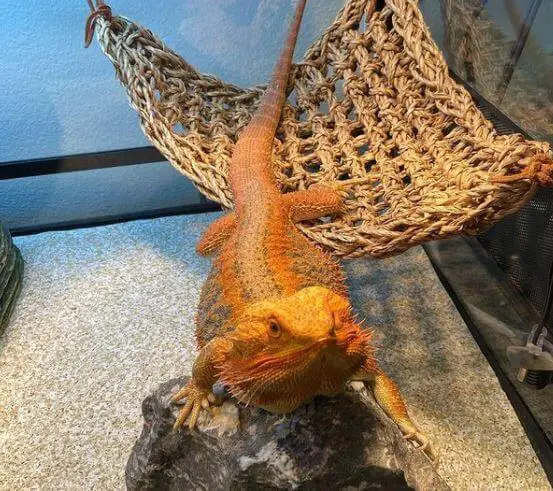
Fortunately, when I found out about another friend’s truth and after much research, I called for calm.
In actuality, bearded dragons always breathe slowly while resting. Their respiration and metabolic rate are shallow. Some owners can not realize if they are sleeping or dead.
After some tests like touching or waking them up, you will know that it is just a false alarm. Over time, you should be more sure about your pet’s behaviors.
3. Covering Their Body With Sand
Sometimes, beardies like to bury their body in the sand while sleeping.
It is similar to a blanket with human beings. The unnatural act might have its roots in the low temperature, frustrating light, or other distractions. You should tackle all of those issues if possible.
On the other hand, there might be a chance that is just their habit. Then, you do not need to worry about it.
4. Long Sleep in Brumation Period
Bearded dragons have a specific brumation (or hibernation) time. That is when they use weeks or months to sleep only. During this time, do not bother them.
When Do Bearded Dragons Sleep?
Another noteworthy sleeping habit of those dragons is the time they rest.
Most people might not know, the reptile is relatively lazy. He can sleep up to 12 hours a day.
Plus, he is active during the day, and he sleeps at night. Similarly, beardies get used to waking up and looking for food when the sun rises in the natural environment. By contrast, they come back to the shelter and rest once it is dark.
That being said, it is crucial to ensure the bearded dragon’s tank is dark enough for their long nap. Juveniles tend to sleep better than adults.
Frequently Asked Questions About Bearded Dragon Sleeping Habits
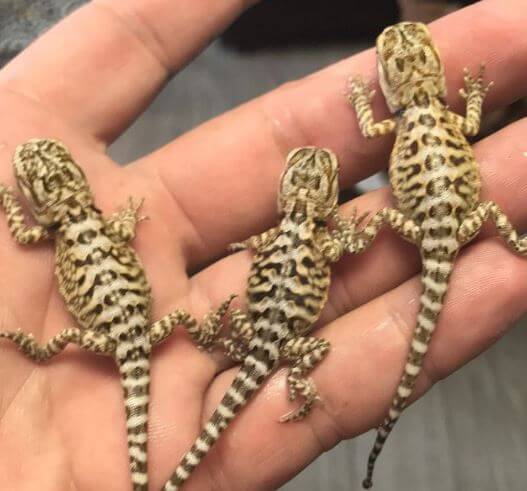
1. Is It Wrong to Wake Bearded Dragons Up?
Of course, it is wrong. Please do not wake up your beardie, especially in his deep sleep state in winter. You can not do much to stop or avoid the condition. Instead, wait for them to get up naturally.
Even if you want to check their slow breath, never do that by changing the lighting or temperature level. He could die without your perception.
2. Can My Bearded Dragon Sleep With Me?
No, it would help if you did not sleep with the pet.
If you bring his safety into the sharp focus, you should not take him to your bed since he owns a small stature.
Plus, he has a relatively odd sleeping posture, so it is dangerous once such a massive body like you lying next to.
3. Do Bearded Dragons Take Naps?
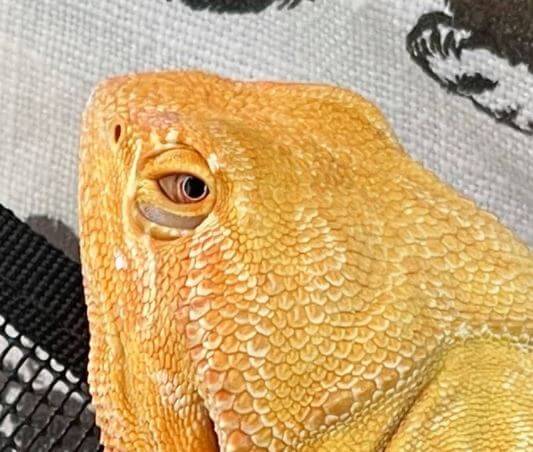
Yes, that kind of dragon does have frequent naps during the day.
Because he is diurnal, he is awake during the day. Once he is free from looking for food, he might become lazier.
As a result, the docile and friendly lizard will nap more often.
4. Should I Turn Off the Light in My Bearded Dragon’s Cage at Night?
You must turn the light off if you want your pet to have a good sleep simply because he does not require any red or other light at night.
Plus, that dragon has a considerable sense of extraneous lighting. So, the red light does not do much except disturbing their resting time.
5. Why Is a Bearded Dragon Standing Up Tall?
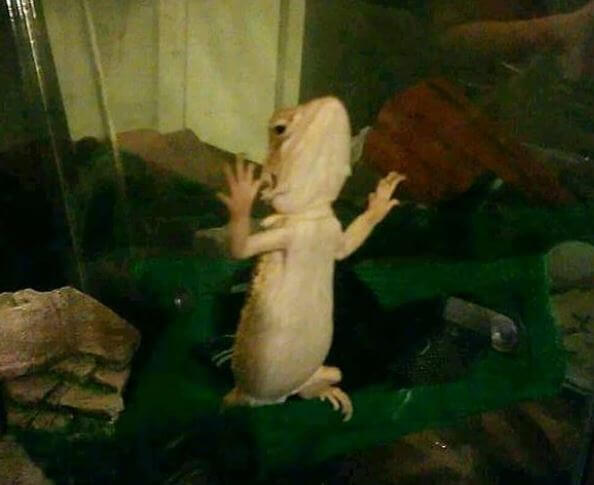
The main reason might be glass surfing. It is when your bearded dragon stands up against the enclosure’s glass wall.
Plus, he may want to come out of the tank.
So, he stands on his hind legs, frantically climbing up. Ironically, the wall is too sleek, so he keeps slipping back to the ground.
Conclusion
Do bearded dragons sleep standing up? Yes, bearded dragons do sleep standing up.
They might do that because they like it, they are stressed, or the temperature is abnormal.
If it is the first case, you do not need to be anxious.
However, with the second and third culprits, consider adjusting their tank’s condition and the heat alike.
Also, besides the odd sleeping posture, beardies have other stunning sleeping habits like breathing slowly and changing color.
Additionally, they always have a long sleep during hibernation time. Plus, they cover themselves with sand while resting from time to time.
Key points for do bearded dragons sleep standing up:
Bearded dragons are known for their unique and sometimes amusing behaviors, and one question that often arises is whether they sleep standing up. Understanding the sleeping habits of these reptiles can provide insights into their behavior and care. Here are some key points to consider:
1. Sleeping Behavior:
- Bearded dragons do sleep, but their sleeping habits are different from those of mammals.
- They are crepuscular animals, which means they are most active during dawn and dusk.
2. Daily Cycle:
- Bearded dragons have a daily cycle that includes periods of activity and rest.
- They are typically more active during the day and tend to sleep at night.
3. Preferred Sleeping Spots:
- Bearded dragons prefer to sleep in secure and sheltered areas.
- They may choose spots in their enclosure that provide some level of darkness and privacy.
4. Burrowing Behavior:
- Bearded dragons have a natural instinct to burrow.
- They may dig or bury themselves in substrate to create a secure sleeping environment.
5. Comfortable Position:
- While they do not typically sleep standing up, bearded dragons can adopt various sleeping positions.
- They may sleep lying down or partially buried in their substrate.
6. Energy Conservation:
- Bearded dragons sleep to conserve energy.
- It’s essential for their overall health and well-being to have periods of rest.
7. Basking During the Day:
- During the daytime, bearded dragons bask under their heat lamps or UVB lights to regulate their body temperature.
- They use this time to absorb warmth and UVB radiation, which is essential for their metabolism and overall health.
8. Proper Sleeping Environment:
- Ensure your bearded dragon’s enclosure has appropriate sleeping spots.
- You can provide hide boxes, caves, or other sheltered areas where they can feel safe and secure.
9. Nocturnal Activity:
- While they are not considered nocturnal, bearded dragons may occasionally move or exhibit brief periods of activity during the night.
- These nocturnal behaviors are relatively rare.
10. Observing Sleeping Patterns:
- Pay attention to your bearded dragon’s sleeping patterns and behaviors.
- Abnormal changes in sleeping habits, such as excessive daytime sleeping or restlessness at night, may indicate underlying health issues.
11. Individual Variations:
- It’s important to note that individual bearded dragons may have variations in their sleeping habits.
- Some may prefer to sleep in different positions or locations.
In summary, bearded dragons do not typically sleep standing up, but rather, they choose secure and sheltered spots for rest. Their sleeping behaviors align with their crepuscular nature, with periods of activity during the day and rest at night. Providing a suitable sleeping environment in their enclosure is essential for their overall well-being, and understanding their natural sleeping habits can help you create a comfortable and secure space for your bearded dragon.
Further Reading:
- Carolina Custom Cages Terrarium Review
- 8 Best Basking Rocks for Beardie: What Is the Best Choice?
- 10 Best Thermometers for Beardie: How to Choose the Best One?
- 5 Best Beardie Lighting Setups for Beardie Lovers
- 9 Best Heat Lamps for Beardie: Natural Habitat Provided

